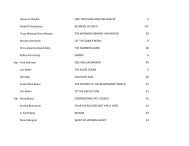nonfiction
nonfiction
nonfiction
You also want an ePaper? Increase the reach of your titles
YUMPU automatically turns print PDFs into web optimized ePapers that Google loves.
“An inspiring and useful memoir from<br />
a significant figure in 21st-century American politics.”<br />
from it worked for me<br />
A UNIFIED THEORY<br />
OF HAPPINESS<br />
An East-Meets-West<br />
Approach to Fully<br />
Loving Your Life<br />
Polard, Andrea F.<br />
Sounds True (400 pp.)<br />
$24.95 | Jun. 1, 2012<br />
978-1-60407-788-9<br />
978-1-60407-818-3 e-book<br />
The pursuit of joy gets a radical makeover.<br />
Polard, a German-born clinical psychologist and practitioner<br />
of “Zen Psychology” (a fusion of Zen Buddhism and Western<br />
behavioral study), imparts 20 years of research into theories<br />
of true contentedness by way of the “Two Wings of Happiness.”<br />
She believes these “wings” can be accessed once the Basic (relating<br />
to those surrounding us) and Supreme (the “Being” within)<br />
modalities of consciousness strike a synergistic balance. Polard<br />
provides sporadic schematics to aid novices eager to discover<br />
her new understanding and valuing of life and its potential for<br />
glee. The author offers an effective contrast between Eastern<br />
and Western spiritual traditions and notes how they can work<br />
together in relation to the cyclical nature of good deeds and<br />
karmic resolve. With careful instruction and compassionate<br />
guidance, she examines meditation, embracing insecurities,<br />
lightheartedness and the importance of defining and isolating<br />
strengths and deficiencies. Polard also provides recommendations<br />
on how to improve competence, ambition, receptivity<br />
and other traits with applicable exercises and supportive media<br />
material. Despite a prolix narrative on a well-worn subject, the<br />
author reinvigorates it with conceptual ponderings rooted in<br />
spiritual theory and substantiated with references drawn from<br />
economists, philosophers, professional journals, poems, prayers<br />
and even the sage musings of advice columnist Ann Landers.<br />
Happiness is accessible to anyone, writes Polard, as long as you<br />
keep an open mind and a willingness to be joyful.<br />
Contemplative, upbeat enlightenment for spiritually<br />
inclined positive thinkers.<br />
IT WORKED FOR ME<br />
In Life and Leadership<br />
Powell, Colin with Koltz, Tony<br />
Harper/HarperCollins (320 pp.)<br />
$27.99 | May 22, 2012<br />
978-0-06-213512-4<br />
With the collaboration of Koltz (coauthor:<br />
Leading the Charge: Leadership Lessons<br />
from the Battlefield to the Boardroom,<br />
2009, etc.), Powell picks up the thread of<br />
his life story.<br />
The author rose in the military to become “the first black<br />
Army officer to have a four-star troop command.” He was chairman<br />
of the Joint Chiefs of Staff during the first Iraq war and served<br />
as secretary of state from 2001 to 2005. The release of his first<br />
book, My American Journey (2003), fueled a groundswell campaign<br />
to nominate him for president in the upcoming election. However,<br />
he recognized that he was not cut out for the job despite his<br />
proven leadership strengths. He describes how, as he advanced in<br />
rank, his military training also prepared him for his role in government.<br />
He learned the importance of always focusing on the mission,<br />
being resolute in the face of danger and setbacks, not being<br />
governed by ego and maintaining a can-do spirit (with the proviso,<br />
“I try to be optimistic, but I try not to be stupid”). A good leader, he<br />
writes, accepts responsibility for the failure of those in his command,<br />
but makes sure to reward them for their successful missions.<br />
Unlike the corporate world, the Army recruits from within<br />
its ranks, which makes recognizing potential and providing continuing<br />
education a primary concern. Powell reviews his profound<br />
disagreements with Defense Secretary Donald Rumsfeld and Vice<br />
President Dick Cheney on the handling of the war in Iraq, while<br />
taking full responsibility for mistakes made on his watch—e.g., his<br />
“infamous speech at the U.N. in 2003” claiming that Saddam Hussein<br />
had weapons of mass destructions.<br />
An inspiring and useful memoir from a significant figure<br />
in 21st-century American politics.<br />
IGNITING THE FLAME<br />
America’s First<br />
Olympic Team<br />
Reisler, Jim<br />
Lyons Press (304 pp.)<br />
$24.95 | Jun. 5, 2012<br />
978-0-7627-7848-5<br />
A writer of numerous baseball books<br />
(A Great Day in Cooperstown: The Improbable<br />
Birth of Baseball’s Hall of Fame, 2006, etc.)<br />
shifts to another summer event, telling the<br />
little-known story of the 1896 Olympics, the first in 1,500 years.<br />
Imagine: An American Olympian shows up for the discus<br />
event, having never really tried it before; some accommodating<br />
Greek athletes demonstrate, and he wins. Such was the state of<br />
turn-of-the-century international athletic competitions. And<br />
so it was that a small American team (14 members) traveled to<br />
Athens, having no idea what sort of competition they would<br />
face. Not much: They came home with 11 firsts to a country now<br />
ecstatic about the Games (yawns had accompanied their departure).<br />
Reisler weaves a handful of narrative threads: the story of<br />
the resurrection of the Olympic Games, and of the men who<br />
accomplished it; the primitive means of travel and lodging; the<br />
stories of the individual American athletes and accounts of the<br />
events; and some whatever-happened-to-those-guys follow-up.<br />
An American won the first medal (James Connolly in the triple<br />
jump), a couple of wealthy pistoleers, almost on a lark, headed<br />
for Greece and took firsts, and another American attempted<br />
the marathon, which was won by the Greeks, to tumultuous<br />
patriotic thunder. The American pole-vaulters passed on all the<br />
lower levels; when they were ready, all the other competitors<br />
were eliminated. Reisler writes well about the oddities—the<br />
photograph of the sprinters lined up in a potpourri of poses is<br />
a howl—but he sets us up for an exciting 100-meter race, cuts<br />
away, then disappoints later with his perfunctory account.<br />
Though the author sometimes writes like the team’s PR<br />
agent, he skillfully records the cries and struggles attending<br />
a nearly miraculous rebirth.<br />
THE ESKIMO AND<br />
THE OIL MAN<br />
The Battle at the<br />
Top of the World for<br />
America’s Future<br />
Reiss, Bob<br />
Business Plus/Grand Central (304 pp.)<br />
$27.99 | May 15, 2012<br />
978-0-89296-076-7<br />
An on-the-ice view of the struggle<br />
over offshore oil exploration in Alaska.<br />
With U.S. demand for oil skyrocketing, major petroleum<br />
companies believe the last huge undiscovered oil fields will be<br />
found north of the Arctic Circle beneath the sea. Out front in<br />
the search is Shell Oil Company, which plans to sink an exploratory<br />
well in the seabed off Alaska’s North Slope this summer.<br />
In this brisk, revealing account, veteran author and journalist<br />
Reiss (Black Monday, 2007, etc.), a former correspondent for<br />
Outside magazine, tells the story of two men whose dealings are<br />
critical to the region’s future. Pete Slaiby is the Shell employee<br />
charged with clearing the way for exploratory drilling. Edward<br />
Itta, an Inupiat Eskimo whaler and the Barrow-based mayor of<br />
the North Slope of Alaska, must protect his people’s natural<br />
resources (“The ocean is our garden,” he says) while ensuring<br />
that acceptable oil drilling generates much-needed tax revenue.<br />
Based on interviews with these men and others, the author<br />
describes the misunderstandings, suspicions and interactions<br />
between Slaiby and Itta in 2010 as they discussed plans that<br />
would transform a pristine region whose waters have sustained<br />
tribal cultures and subsistence hunting for many generations.<br />
Itta, concerned at first about the possibility of oil spills and<br />
that seismic work might scare off whales, helped build safeguards<br />
into Shell’s drilling plans for 2011, which were eventually<br />
thwarted by U.S. agencies. While Russia and other nations have<br />
clear-cut policies on Arctic oil, the U.S. has long remained indecisive.<br />
With Itta working to convince environmental and other<br />
groups to hold off on further lawsuits to block Shell’s exploration<br />
of its offshore leases, both he and Slaiby gradually became<br />
“uneasy allies” who recognized that their common enemy was a<br />
byzantine federal government mired in regulations and policies.<br />
A rewarding glimpse behind the Alaska oil headlines.<br />
THE OCEAN OF LIFE<br />
The Fate of Man<br />
and the Sea<br />
Roberts, Callum<br />
Viking (432 pp.)<br />
$30.00 | May 24, 2012<br />
978-0-670-02354-7<br />
Roberts (Marine Conservation/Univ.<br />
of York; The Unnatural History of the<br />
Sea, 2009) warns that “the oceans have<br />
changed more in [the] last thirty years<br />
than in all of human history before.”<br />
In this follow-up to his award-winning account of man’s 1,000-<br />
year exploitation of maritime resources, the author not only documents<br />
the loss of large sea animals, such as whales, sharks and<br />
turtles and the destruction of coral reefs and the broader ocean<br />
environment, but he anticipates further devastation from the<br />
onset of deep-sea mining in the near future. While environmentalists<br />
are keenly aware of the danger man poses to animal species,<br />
Roberts suggests that the oceans have always played a significant<br />
role in human survival. He writes that the view of our ancestors as<br />
a “plucky species” of big-game hunters has a “certain mythological<br />
ring to it.” However, our early survival may have depended mainly<br />
on water creatures for sustenance: “Could our shift to bipedalism<br />
have been an aquatic adaptation developed by wading to gather<br />
shellfish” While the author notes that the 1880s shift to steam<br />
power and then later to diesel “heralded the beginning of the modern<br />
era in commercial fishing,” these were still just improvements<br />
on more traditional fishing methods. Not so the introduction of<br />
echo sounders and other electronic devices augmented by computers<br />
and satellites, which now allow fishermen to detect the presence<br />
of fish with an extremely high degree of precision. Roberts<br />
maintains his optimism while looking at the problems that have<br />
been compounded by global warming, pollution, the destruction of<br />
marshlands, etc., and he notes that remedial action is still possible.<br />
It is not too late, he writes, for “strategies that rebuild nature’s vitality<br />
and fecundity”—e.g., protecting one-third of the ocean from<br />
direct exploitation and restricting fishing of tuna, salmon and cod.<br />
A timely wake-up call.<br />
WHAT MONEY<br />
CAN’T BUY<br />
The Moral Limits<br />
of Markets<br />
Sandel, Michael J.<br />
Farrar, Straus and Giroux (256 pp.)<br />
$27.00 | Apr. 24, 2012<br />
978-0-374-20303-0<br />
Sandel (Government/Harvard Univ.;<br />
Justice: What’s the Right Thing to Do, 2010,<br />
etc.) sounds the alarm that the belief in a<br />
market economy diminishes moral thought.<br />
Taken to its extreme, a market economy dictates that any<br />
inanimate object, any animal, any human being can be bought<br />
830 | 15 april 2012 | <strong>nonfiction</strong> | kirkusreviews.com |<br />
| kirkusreviews.com | <strong>nonfiction</strong> | 15 april 2012 | 831






